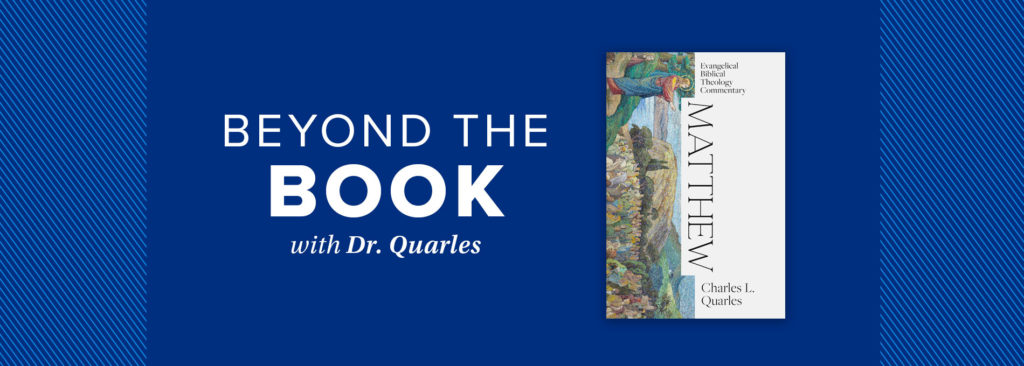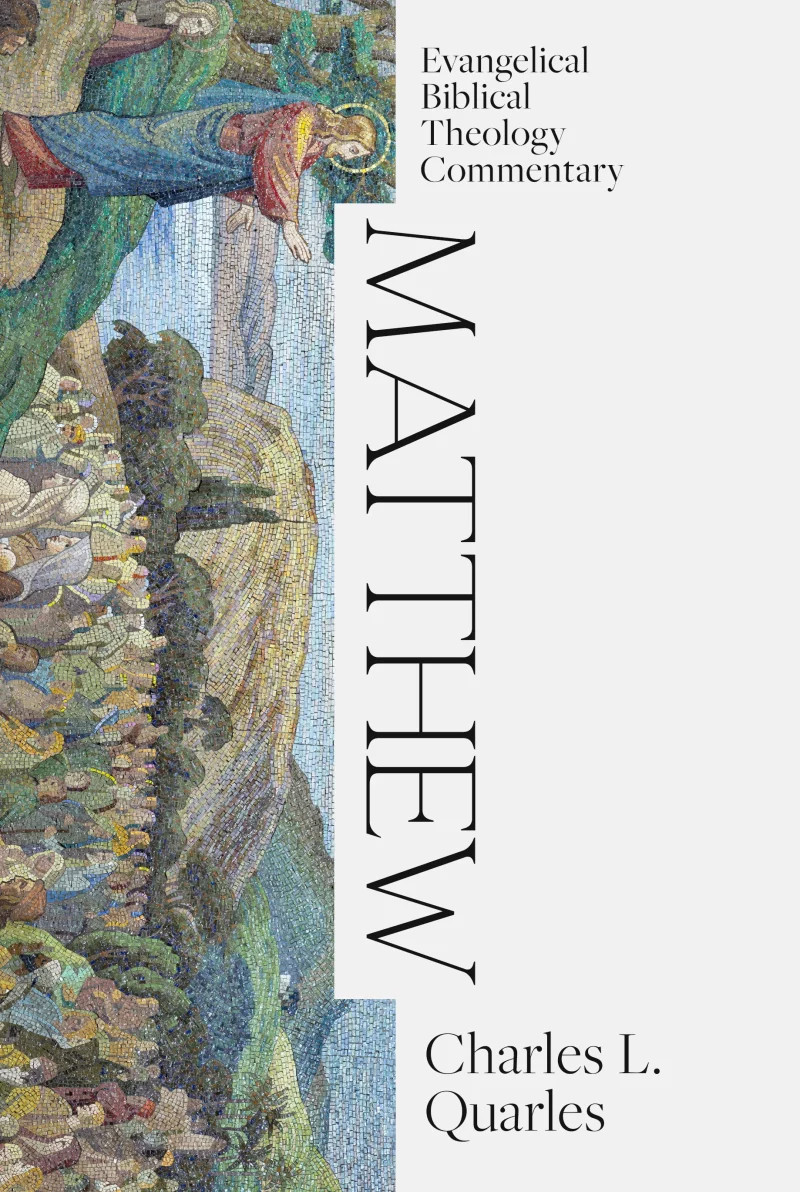Beyond the Book with Dr. Quarles: “Matthew”
Chad Burchett | December 19, 2022

Are you looking to better interpret, understand, and teach the Gospel of Matthew, including its expansive Christological themes? If so, you will be profoundly blessed by the new “Matthew” commentary written by Chuck Quarles, Research Professor of New Testament and Biblical Theology and Charles Page Chair of Biblical Theology at Southeastern Baptist Theological Seminary. As a part of the Evangelical Biblical Theology Commentary Series, Quarles’s “Matthew” combines deep exegetical insight with extensive reflection on biblical theology to equip pastors, professors, and ministry leaders to understand and teach the book and participate more fully in God’s mission.
Rich in Christological themes and in implications for biblical theology, Matthew’s Gospel offers a profound glimpse into the redemptive mission of God. Notably, the Great Commission punctuates the end of Matthew’s Gospel, but as Quarles helps us to see in his new commentary, Christ’s love for the nations and his kingdom mission permeate the entire Gospel.
In the following Q&A, Quarles takes the time to answer a few questions about his new book:
How is this commentary on Matthew’s Gospel distinctive from other commentaries?
Many commentaries focus on history at the expense of theology. The goal of this commentary is to give readers a new appreciation for this Gospel’s rich theology and to equip pastors to preach the Gospel of Matthew with an emphasis on the great doctrines of the Christian faith. I have long been concerned about the doctrinal anemia of many modern churches. This commentary gave me the opportunity to highlight the theological themes in every single verse of this beloved Gospel and to trace some of their connections to the theology of the Bible as a whole.
The goal of this commentary is to give readers a new appreciation for this Gospel’s rich theology and to equip pastors to preach the Gospel of Matthew with an emphasis on the great doctrines of the Christian faith.
The commentary also places a greater emphasis on the background of the Gospel narratives in order to help modern readers understand the Gospel like the original readers would have. The commentary will frequently show how knowledge of ancient Jewish literature (ranging from documents written between the time of the Testaments to later rabbinic works) can illuminate the teachings of Jesus and the events in his ministry.
I had no interest in writing a commentary that simply parroted what other fine commentaries have already expressed. To avoid the remarkable similarity to other commentaries that marks many volumes in modern commentary series, I chose to write the initial draft of the commentary based on my own careful analysis of the Greek text of Matthew while consulting only primary sources like lexica, grammars, and ancient Jewish literature. After the completion of the first draft, I consulted important ancient and modern commentaries, journal articles, and dissertations to see if they presented evidence that might prompt me to change my own independent interpretation. This approach ensured that I did not slavishly follow the views of other respected commentators. Several of the initial responses to the commentary have expressed appreciation for its distinctiveness.
Who is the target audience?
The commentary was written for preachers, teachers, and well-informed Christians. However, the commentary hopefully makes some important scholarly contributions. Several pastors have been using early drafts of the commentary as they preach from the Gospel of Matthew and their responses have been encouraging.
What motivated you to write the commentary?
I have preached, taught, and written on the Gospel of Matthew for the last thirty years. My doctoral dissertation published back in the nineties focused on the historical reliability of Matthew’s account of Christ’s birth. I later wrote a commentary on the Sermon on the Mount, then a Theology of Matthew, and then the volume on Matthew in the Exegetical Guide to the Greek New Testament. I am currently co-editing a volume of scholarly essays on the Gospel for T&T Clark’s Library of New Testament Studies series. Along the way I have written academic essays, journal articles, and critical reviews related to the Gospel. I feel that this extensive commentary is in a sense the culmination of my all my work on the Gospel up to this point in my life. But I do not want to give the impression that I am finished with the Gospel of Matthew. I am still learning from this rich Gospel, every single day. I look forward to continuing to write about this Gospel as long as God gives me breath.
How does the theology of Matthew’s Gospel uniquely contribute to the theology of the Gospels?
Many modern students of the Gospels have been led to believe that one finds a truly high Christology among the Gospels only in the Gospel of John which is presumed to have been written late. This is terribly mistaken. Even the Synoptic Gospels, especially the Gospel of Matthew, have a remarkably high Christology. Matthew, like John, portrays Jesus as the incarnation of Deity, the embodiment of the glory of God. Matthew not only describes Jesus as the Immanuel, God with us, he applies to Jesus the name of God, the titles of God, OT texts describing God, and ascribes to him the activities of God. Matthew also uses rich typology to reveal the mission of Jesus. He portrays Christ as the new and greater David who came to reign over a universal and eternal kingdom, the new and greater Moses who came to enact the new covenant and proclaim the messianic Torah, and the new and greater Abraham who came to form a new people belonging to God. This only scratches the surface. Paragraph after paragraph of this powerful witness to Jesus highlights some important theological theme.
What interpretive matters or themes in Matthew’s Gospel are often neglected or misunderstood?
Unfortunately, there are far too many issues that are neglected or confused to summarize briefly. Sadly, the entire approach to Gospel interpretation that is common in the church today is misguided. Too often the goal is to derive some intensely practical lesson from every Gospel account as if the purpose of every Gospel account is to point to some “moral of the story,” some principle of wisdom, that can help us in our daily living. This overlooks the fact that the Gospels explicitly state that they were written primarily as witnesses to the Lord Jesus—to tell us who he is, why he came, how he saves, forgives, and changes sinners, and why he is worthy of all our worship and devotion. Too often the Gospels are read as if we are the major characters in the story when, in fact, Jesus was and is to be the focus. When we forget that the Gospels are Christocentric, not anthropocentric, we are destined to abuse them and to overlook the very things that mattered most to the apostle Matthew and should matter most to us.
Too often the Gospels are read as if we are the major characters in the story when, in fact, Jesus was and is to be the focus.
How does Matthew’s Gospel uniquely equip readers to serve the church and fulfill the Great Commission?
No greater service can be offered to the church than to preach Jesus, the Immanuel who came to “save his people from their sins.” No New Testament book more clearly or beautifully presents Christ in all his glory and grace to us than the Gospel of Matthew. It is no wonder to me that it was the favorite Gospel of the early church.
The Gospel of Matthew, more powerfully than any other Gospel, displays Christ’s mission of including the nations in his great kingdom. The Great Commission that ends this Gospel restates a theme of Christ’s love for the nations that permeates the entire Gospel. The very first verse reveals that Jesus is the “son of Abraham,” the promised seed of Abraham through whom all nations on earth will be blessed. So from the first verse of this Gospel to its final verse, Christ’s mission to reach the nations pulses through this book. Although Acts is generally regarded as the great missionary book of the New Testament, when properly understood, Matthew is just as intensely focused on God’s love for and mission to the world.
From the first verse of this Gospel to its final verse, Christ’s mission to reach the nations pulses through this book.
How has researching and writing this commentary shaped you spiritually and deepened your understanding of Matthew’s Gospel?
I will answer this question by just quoting the first and then the final paragraphs from the preface of the commentary written on Christmas Eve in 2020:
I am baffled when friends tell me how much they hate writing biblical commentaries. Writing this commentary was no drudgery. In fact, it has been one of the greatest joys of my life. I have been thrilled to have the opportunity to pore over the pages of this precious and awe-inspiring account of the life and teachings of my Lord and Savior, day after day, year after year. Though this is my fourth book on the Gospel of Matthew, every day of study has led to new discoveries that were challenging and inspiring and drew me closer to Christ. Writing this commentary was not a mere scholarly enterprise; it was an act of worship. I pray that the commentary will draw the reader into that worship.
. . . Although years of hard work have been invested in this commentary, I confess that I release it now with a profound sense of its inadequacy. It captures too little of the glory of Immanuel that saturates the pages of this beautiful and powerful Gospel. My only consolation is that the commentary may beckon readers to the fervent and life-long study of the Gospel itself. His great glory beams brightly there. And when you glimpse it, you will never be the same again.
Matthew: Evangelical Biblical Theology Commentary (EBTC)
The Gospel of Matthew brings out treasures old and new.
Charles L. Quarles demonstrates that the Gospel of Matthew is foremost a testimony about Jesus. Each pericope centers on Jesus and reveals something about who he is, what he has done, and what his disciples should do in response. Quarles teases out Matthew’s unique theological presentation of Jesus’s identity and work. Jesus is the new and greater Moses and the new and greater David who fulfills Old Testament hopes by establishing God’s covenant and kingdom. This Gospel invites us to know and worship Jesus, who makes all things new.
January 4, 2023
Hardcover, 920 pages
